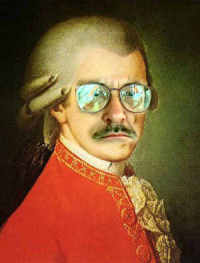A 365-Day Project
"We Are All Mozart"
A project to create
new works and change
the perception of the
music of our time.


 June 5, 2006
June 5, 2006 
It's raining today again. Except for a three-day window to plant our garden, it's rained for a month. So it gives me time to think about the "every work a masterpiece" problem.
Since announcing this project, I've been beset by composer skeptics, among them composers I know well and enjoy personally. Sifting through the objections reveals two major complaints: inspiration (in whatever guise it's suggested) and perfection.
Folks who know me well are aware that I rarely address either issue, and it makes me peevish. I've never had an inspiration in the classic Brahms-as-The-Thinker mental pose. Ideas come more like the rainbows of oil spills, by accident of bad design. I wrote about the process some years ago in "I Don't Know How -- Or Why: Night Thoughts on the Process of Composition," and it still holds true. That's how I work. A backlog of sonic ideas is always ready to spill onto the page, a way of approaching composition that appears incongruent with the process most other composers follow. (It actually may be more closely related than I think, except that I perform equivalent sketching and discarding and editing 'off the page'. What others describe as inspiration, I think of as accident.)
And that brings me to perfection.
Among my compositional struggles is being thrilled by concept and troubled by execution. A concept arrives as a cluster of sound shapes, or perhaps I'm handed an orchestration and a time limit, such as the recent Eventide for piccolo, E-flat clarinet, and contrabassoon, and the sound shapes begin to clump up. My gatherer argues with my editor: "Ooo, that's pretty." "Nyaah, that's cheap." "Yo, I have a cool idea." "It's stupid. And been done." I'm not sure how other composers approach this editing-while-writing task, or if they do it in three steps: think/edit, write/edit, edit/edit.
Aside: When I say "write", I include the creation of electroacoustic works as well. It's a different process of origin, but the assembly and testing, so to speak, of an electroacoustic piece is akin to writing and editing.
The aspect of my project and of composition in general that troubles composers is the imperfection of it all -- to use the hagiographied name of Mozart and to invite such a quantity of composition in the same project is vexacious. That imperfection may lie in an individual work's flaws, or in the desire to stay within genre boundaries. Hence come the opera composers, symphonic/chamber composers, electroacoustic composers, avant-garde composers, film composers, world music composers, and so on.
John Updike recently spoke about authors staying within certain boundaries. His reference point wasn't the same, but his conclusion was: "It's a question of whether or not you're going to be scared by all this ethnic awareness and possessiveness into writing about nothing but septuagenarian, Eastern-born Lutherans. You get boxed in by your own fear of making a misstep."
Composers self-limit. This is not a denigration of their personal searches for scores that accurately reflect their imagined results. Rather, composers -- many artists -- draw sacred circumscriptions beyond which they will not tread. There are composers who have never created a second of electroacoustic music, and conversely, composers who have never written for an acoustic instrument. Some composers believe only in the communal improvisation, while others notate every detail of performance.
Confinement to a genre invites a depth of attention. Guitarists will scratch guitar parts in staggering detail, string players will fret over every bow. Since the majority of composers are genre composers, an artificial perfection arises. But often it's a perfection that drives fussiness, a perfection combined with the large shadows of the past I recently wrote about. If Bartók was great with strings and weak with brass, then we remember the strings and adopt the model for self-comparison.
I have to admit a distinct lack of enthusiasm for fussiness in scores, and by that I mean fussing over the present-day possible and present-day audible. I recently observed a composer's drafts, where a state of editing was ongoing for months after the work's effective completion. More months later, he was matching the score to what he had learned in a reading session -- as if one orchestra and one conductor could reveal what was provided to them in the score.
We have arisen out of that time. All is possible and all is audible. How can that be? Because a piece infused with rich content will be interpreted widely and differently. By thinning acoustic plantings or trimming unseemly technique demands, we capitulate to economics, but more importantly, we limit the opportunity first to say what we mean and second to offer ways of discovering what we mean. (What language are we speaking? That's a topic for another day.) And, of course, the acoustic world has faded. Most music comes to the listener on recording, and recordings of the future will reshape and rebalance the sound to our will. (In some ways, composers' computer-produced demos already challenge the acoustic regime.) Yes, we're in a retreat from fidelity as iPod listeners engage in compressed downloads, but that is a temporary circumstance. With few periods of backsliding, reproduction technology has moved toward more detail and greater listener involvement in the process of music audition.
But composers? We're also lazy louts. If we don't have schedules, we get nothing done. My friend Samuel says that he'd "be more interested in doing fuckall" than composing so much. So how can every work be a masterpiece if we're such an indolent lot?
No more now. The sun's come out...